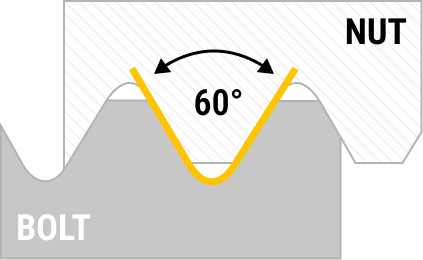
16-UN Thread (USA)
The system of thread standards in the USA includes a set of threads with unchangeable pitch. One of these is the 16-UN thread. All threads listed in this standard have a number of threads per inch that always stands at 16. The constant pitch is then combined with a range of outer diameters. Besides the 16-UN thread, there are other variants of this UN series with 4, 6, 8, 12, 20, 28, or 32 threads per inch – or threads per inch (TPI), as the term is in English. The 16-UN thread is standardized according to ANSI/ASME B1.1, designed by the American Society of Mechanical Engineers (ASME), and monitored by the American National Standards Institute (ANSI).
The 16-UN thread is an imperial thread with a 60° flank angle. The thread designation consists of the outer diameter and the abbreviation 16-UN. Since the pitch is always uniform and also a fixed part of the abbreviation, it does not need to be mentioned separately, as is otherwise the case with American thread standards. Thus, a 16-UN thread designation would be, for example, 1/2″ – 16-UN.
In the hierarchy of American thread standards, the 16-UN thread is below the most common and widely used standards UNC, UNF, and UNEF. This means that if a thread with a pitch of 16 threads per inch occurs in these thread standards, it belongs to this higher-level standard, not to the 16-UN thread. An important note, should you not find what you are looking for in the 16-UN thread table as expected.
The constant pitch influences the range of sizes that can be depicted in the 16-UN thread table. Not every outer diameter makes sense in combination with 16 threads per inch, so these are also not part of the standard. Below you will find 16-UN threads with diameters from 7/16″ to 6″. We have also translated all imperial values into the corresponding metric value. Also indicated is the diameter you need for core hole drilling. To get to the dies and taps for the 16-UN thread, follow the links in the table.
